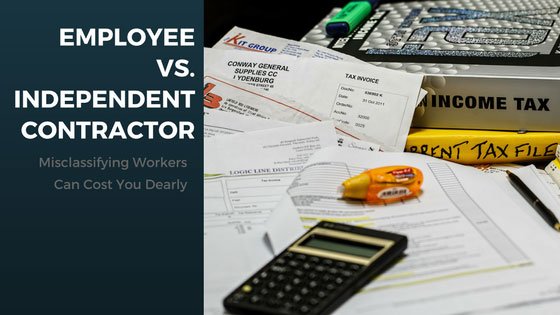Is Your Independent Contractor Truly Independent?
As a business owner, you will most likely have people working for you at some point in your company’s existence. These workers can either be employees or independent contractors. How they are classified makes a significant impact on their rights and protections. Contrary to what many business owners believe, it is not the title you give that determines whether a person is an employee or independent contractor - it is the working relationship you that you share. That means you could have someone working for you that holds the title of an independent contractor but a closer look at the business relationship reveals that the person is actually an employee.
In contrast to independent contractors, employees enjoy workplace protections such as minimum wage and overtime, unemployment insurance, workers’ compensation and protection from discrimination. Not only does worker classification affect the workers’ rights, it also affects your responsibilities under federal and state taxation laws.
Employers face severe penalties for misclassifying workers. If you have people working for you, whether under 1099 or W-2 status, it is always a good idea to talk with an experienced business taxation lawyer about legally evaluating your workers’ classification.
Exactly Who is an Independent Contractor? The Working Relationship Says it All
The US Department of Labor (DOL) borrows from the Fair Labor Standards Act ‘s (FLSA) definition of “employ” to determine whether a person is an employee. It uses “economic realities” factors as a guide to examining the working relationship. These are the factors considered:
The extent the worker’s work is integral to the business - If the worker’s work is integral to the business, the worker is likely economically dependent on the employer, and would be classified as an employee, not an independent contractor.
Managerial skills affecting the business’ profits and losses - Managerial skills are indicated by investment in equipment or supervision of workers. Does efficient management mean higher earnings? Employees have set wages and only share in the business profits and losses by express agreement. However, independent contractors can increase their earnings if they perform more efficiently.
Worker’s Investment in equipment and other facilities - If a worker makes a significant investment in the work, comparable to the employer’s investment and to the extent of bearing risk, then the worker is likely an independent contractor.
Worker’s skill and initiative - Independent contractors are free to exercise their own initiatives and judgment. They may pick the work to do or set their own prices. They may even take advantage of the open market to compete with others.
Permanency of worker’s relationship - Permanency or indefiniteness of a working relationship indicates the worker is likely an employee, not an independent contractor.
Nature and degree of employer’s control - The greater the control held by the business owner, the more likely the worker is an employee. Control can be exercised over plenty of things including wages, work hours and who the worker can work for.
The IRS Is Also Interested in Worker Classifications
In addition to DOL and FLSA considerations, Uncle Sam also has a vested interest in seeing your workers classified correctly. This is because employers are required to withhold certain amounts from employees’ paychecks including income taxes, social security and Medicare taxes. Independent contractors, on the other hand, are responsible for their own taxes. If an employer is not properly deducting income taxes, the IRS can take action against the employer, often imposing steep fines for what is often an innocent error.
IRS Independent Contractor Test
The IRS uses three factors to determine whether a worker is an employee or independent contractor. These are financial control, behavioral control and the type of relationship. These three factors are further broken down into a 20-Factor Test that the IRS uses to determine whether someone should be classified as a contractor or an employee. Most states use these factors in determining employee classification as well. The onus is on the employer to prove that a worker is not an employee, but rather, an independent contractor. This can be quite complex and would be best done in consultation with an experienced business taxation attorney.
If you have questions about classifying employees and independent contractors or other business taxation matters, schedule a consult with taxation attorney Stephen Thienel today. Mr. Thienel has decades of experience assisting clients in business taxation and tax preparation, IRS litigation, tax compliance, and tax planning for individuals and businesses. Thienel Law, LLC serves clients in Maryland, Virginia, and the District of Columbia.
This Blog/Web Site is made available by Stephen Thienel and Thienel Law, LLC for educational purposes only as well as to give you general information and a general understanding of the law, not to provide specific legal advice. By using this blog site you understand that there is no attorney-client relationship between you and Stephen Thienel and Thienel Law, LLC. The Blog/Web Site should not be used as a substitute for competent legal advice from a licensed professional attorney in your state

